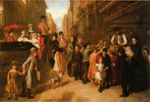
This Live, Throbbing Age
"All actual heroes are essential men, / And all
men
possible heroes" (5.151-52).
Elizabeth Barrett Browning's Aurora Leigh (1856)
Points for Reflection
Aurora Leigh, Book Five
- what array of things does Aurora hope her poetry will powerfully describe, proving itself “in mysterious tune / With man and nature” (5.2-3)?
- why does Aurora briefly declare she will fail to create verse so “plainly in tune to these things and the rest” that her readers will be compelled to contemplate the issues she raises (5.24-30)?
- what is the tone of Aurora’s observation that “We women are too apt to look” towards the immediate and personal, that “we must have mediators / Betwist our highest conscience and the judge” (5.42, 49-50)?
- what conditions does Aurora Leigh place upon Art in order for it to be considered good art? Which canonical British works of literature do you believe would fall outside the boundaries she prescribes?
- what faults does Aurora locate in her descriptive poem entitled “The Hills”?
- which of Emmanual Swedenborg’s ideas about the spirit world has Aurora, like EBB herself, embraced (5.120-125)?
- does Aurora agree that the epic poem belongs in the past, that there’s no place for it in the present?
- what temporal conditions does Aurora Leigh place upon Art before she will consider it good? Which canonical British works of literature do you believe would fall outside the boundaries she prescribes?
- why might Aurora gender epic literature as feminine in lines 5.213-222?
- does Aurora affirm any rules of form for literature?
- which matters more to the poet Aurora Leigh, form or substance? Reason or passion?
- does Aurora believe that the poet should concern her/himself with contemporary praise?
- recall that Robert Browning was a playwright in the 1830s and 40s, but that EBB encouraged him to focus on poetry. What justification does Aurora provide for privileging poetry over the drama, and is she convincing?
- does Aurora hold forth any hope for the drama?
- what does Aurora mean by the claim, “The artist’s part is both to be and do” (5.367)?
- what is the poet’s “sorrowful great gift,” this burden “of a twofold life” (5.380-81)?
- why is Aurora, having just completed publication of a book onto which she wrung her lifeblood (5.352-64), sad?
- why does Aurora consider God to be the only one who truly understands the dismal position of the female artist (5.434-47)?
- if Aurora has to choose between the two, which does she declare is more important, man’s love or God’s truth (5.497-501)?
- what does Aurora envy about the fellow writers she names (all male)?
- what caveat does Aurora offer to her claim that “Death quite unfellows us” (5.552)?
- what has Romney apparently done with his family’s estate, Leigh Hall?
- if you had to extrapolate E.B.B.’s own opinion concerning female beauty and modesty from both Aurora’s thoughts on Lady Waldemar and the dialogue between Sir Blaise and the young German student concerning this beautiful woman (5.612-92), what would that opinion be?
- what services does Lord Howe render to Aurora at the party? Does the narrator wish us to dislike him?
- Lord Howe asks his friend Aurora Leigh to “compromise” for her own wellbeing. What does he mean, and what is her response?
- how does Aurora justify to herself Romney’s marrying Lady Waldemar?
- how high is the personal cost of being an artist, according to Aurora Leigh? Does the cost seem worth it?
- Marian Erle condensed the rationale for her changed plans down to two reasons in lines 4.956-57. Does Romney’s apparent relationship with Lady Waldemar support Marian’s assertions?
Aurora Leigh, Book Six
- Aurora Leigh appears quite willing to point out the weaknesses of the French people. Why, then, does she decide she loves the country so much and wish it to be—along with Italy—another mother country to her?
- Aurora appreciates that “trade is art, and art’s philosophy” (6.96-97) in Paris, yet seems ambivalent about the country’s artistic production. Why?
- Aurora declares she “would be bold and bear / To look into the swarthiest face of things, / For God’s sake who has made them” (6.147-49). What kinds of supposedly ignoble things in human experience does she believe should be reevaluated by the artist?
- is it possible to reconcile Aurora’s words about lower class people in 6.161-203 with her reflections in lines 4.542-601?
- does the social and spiritual power Aurora wishes to assign to poetry seem plausible (6.204-225)?
- do we fault Aurora for her initial assumptions about Aurora’s situation? What contemporary (Victorian) rules of propriety and morality shape Aurora’s suspicions?
- what is Aurora really asking when she wonders aloud if the one-year-old baby’s “‘mother’s palms are clean’” (6.618)?
- what subtle suggestions about the nature of romantic love are embedded in Lady Waldemar’s words to Marian (6.992-1098)?
- what impact does Marian Erle's recent trauma have on her temperament?
- do we blame Marian for her incredible faith in Lady Waldemar, or pity her (6.938-1201)?
- does Elizabeth Barrett Browning provide enough detail to make clear what Marian has been through, or should she have been more explicit?
- what do you make of the references to Christ and his mother Mary in the final lines of Book Six? Does the traumatized Marian find encouragement in seeing a crucifix and being given a medallion w/ Mary’s image on it?

Poverty and Wealth (1889)
William Powell Frith
Dr. Paul Marchbanks
pmarchba@calpoly.edu
![]()
